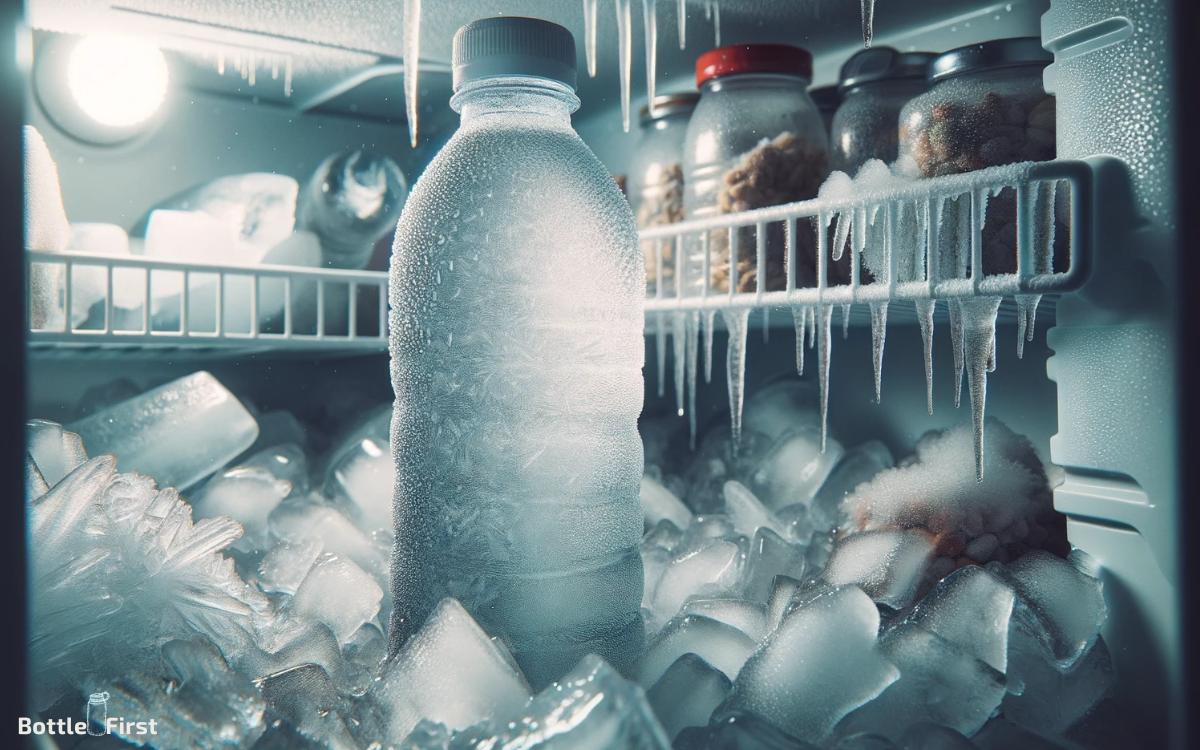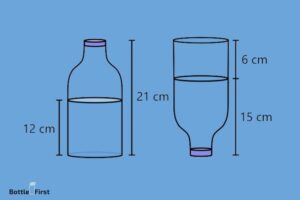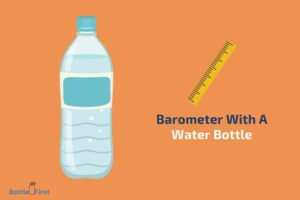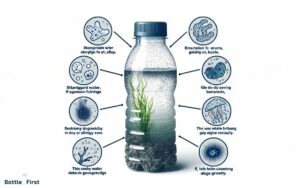Can You Freeze a Water Bottle? Yes!
Yes, you can freeze a water bottle as a means to keep drinks cold for extended periods. Freezing water bottles is a common practice, especially during hot weather or for outdoor activities.
When you freeze a water bottle, the water expands as it turns into ice. This can cause bottles to crack or burst if they are completely full or not designed for freezing. To avoid this:
- Leave some space at the top of the bottle to allow for expansion.
- Use a bottle that is freezer-safe.
Example: A sports water bottle with a wide mouth and durable plastic is often suitable for freezing.
Ensure the lid of the water bottle is loosely fitted when placing it in the freezer to accommodate the expanding ice without causing the bottle to deform or break.

Key Takeaway
Freezing Water Bottles: Safety Guidelines
Before freezing any water bottle, it is essential to carefully read and follow the safety guidelines provided by the manufacturer.
Some water bottles are designed to withstand freezing, while others may not be suitable for freezing due to the risk of breakage or deformation. To ensure safety, check if the bottle is labeled as freezer-safe.
Additionally, leave some extra space at the top of the bottle to allow for expansion as the water freezes. Failure to do so may cause the bottle to burst.
It’s also important to consider the type of material the bottle is made of, as certain plastics may leach harmful chemicals when exposed to extreme temperatures.
Benefits of Freezing Water Bottles
When considering the benefits of freezing water bottles, it is essential to understand the advantages they offer for maintaining cold temperatures and providing refreshments on the go.
Some benefits of freezing water bottles include:
Long-lasting Chill:
- Freezing water bottles ensures that the water stays cold for an extended period, making it perfect for outdoor activities or long commutes.
- Imagine A refreshing sip of ice-cold water after a strenuous workout or during a hot summer day.
Reduced Waste:
- By freezing reusable water bottles, there is a reduced need for single-use plastics, contributing to a more sustainable environment.
- Visualize A world with fewer plastic bottles in landfills and oceans, thanks to reusing and freezing water bottles.
This innovative approach not only keeps drinks cold but also promotes environmental responsibility. However, it’s important to consider the potential risks associated with freezing water bottles.
Risks of Freezing Water Bottles
While freezing water bottles offers benefits such as long-lasting chill and reduced waste, it is important to consider the potential risks associated with this practice.
One major risk is the potential for the plastic bottle to crack or deform due to the expansion of the water as it freezes. This can lead to leakage and make the bottle unusable.
Additionally, there is a concern about the release of chemicals from plastic bottles into the water when exposed to extreme temperatures, although this risk is generally low with bottles designed for single use.
Furthermore, if the water is frozen for too long, it can develop an unpleasant taste as it absorbs odors from the freezer.
Monitoring the condition of frozen water bottles and using them within a reasonable timeframe can help mitigate these risks.
How to Properly Freeze a Water Bottle
Freezing a water bottle properly involves following specific steps to prevent damage and ensure the bottle remains usable.
To properly freeze a water bottle, follow these steps:
- Choose a durable, freezer-safe water bottle to prevent cracking or breakage.
- Look for a bottle made from high-quality, BPA-free plastic or stainless steel.
- Ensure the bottle is designed to withstand freezing temperatures without compromising its structural integrity.
Alternatives to Freezing Water Bottles
An alternative to freezing water bottles is using insulated containers to keep drinks cold without the need for freezing.
Insulated containers utilize advanced materials and technology to maintain the desired temperature of the beverage for an extended period.
These containers are designed to provide efficient thermal insulation, preventing heat transfer between the drink and the external environment.
Some insulated containers also come with additional features such as vacuum insulation, which further enhances their ability to keep beverages cold.
Furthermore, these containers are not limited to just water; they can also be used for a variety of drinks, including juices, smoothies, and even carbonated beverages.
Tips for Using Frozen Water Bottles
When using frozen water bottles, they can act as a portable ice pack, making them perfect for keeping food and drinks cold while on the go.
Additionally, frozen water bottles can serve as a convenient way to ensure hydration is readily available, especially during outdoor activities or when access to a refrigerator is limited.
As the ice melts, the water inside the bottle can be consumed, providing a refreshing and sustainable source of hydration.
Water Bottle Cooling
Using frozen water bottles is an effective method for cooling beverages without diluting them with ice. This method provides a convenient and mess-free way to keep drinks cold, making it ideal for outdoor activities, picnics, and travel.
When using frozen water bottles for cooling, consider the following tips:
- Preparation: Ensure the water bottles are completely filled before placing them in the freezer to maximize the cooling effect.
- Uniform Freezing: Lay the water bottles on their sides in the freezer to allow for uniform freezing and to maximize surface area contact with the beverage container.
Additionally, the frozen water bottles can serve a dual purpose by providing a refreshing drink as they thaw.
Now, let’s delve into the next section about ‘portable ice pack’.
Portable Ice Pack
Frozen water bottles can serve as an effective portable ice pack for keeping items cold without the mess of melting ice.
When using frozen water bottles as ice packs, it is important to wrap them in a cloth or towel to prevent direct contact with the skin, as they can get quite cold.
Additionally, placing them in a cooler or insulated bag alongside food and drinks can help maintain a lower temperature for a longer period.
As the frozen water bottles gradually thaw, they can also provide a source of refreshing hydration.
This method not only reduces waste but also provides a versatile cooling solution for outdoor activities, picnics, and travel.
Hydration On-The-Go
To ensure convenient hydration on the go, repurposing frozen water bottles as portable ice packs provide a sustainable and versatile cooling solution for outdoor activities, picnics, and travel.
This innovative approach not only keeps beverages cold but also offers additional benefits:
- Multi-functional Use: Frozen water bottles can serve as makeshift ice packs to keep perishable items cool in a cooler or picnic basket, and as they thaw, the water can be consumed, reducing waste.
- Imagine: A refreshing hike with a backpack filled with frozen water bottles that gradually turn into chilled drinking water as the day progresses.
- Environmental Impact: By using frozen water bottles instead of disposable ice packs, individuals can reduce single-use plastic waste and minimize their environmental footprint.
- Visualize: A cleaner environment with fewer plastic ice packs discarded after a single use.
Conclusion
In conclusion, freezing water bottles can be a convenient way to have a cold drink on the go. It’s important to follow safety guidelines and be aware of the potential risks.
Properly freezing a water bottle can help keep your drink cold for longer periods of time. However, there are also alternative methods to consider.
By understanding the benefits and risks, and following proper techniques, you can make the most of frozen water bottles.






